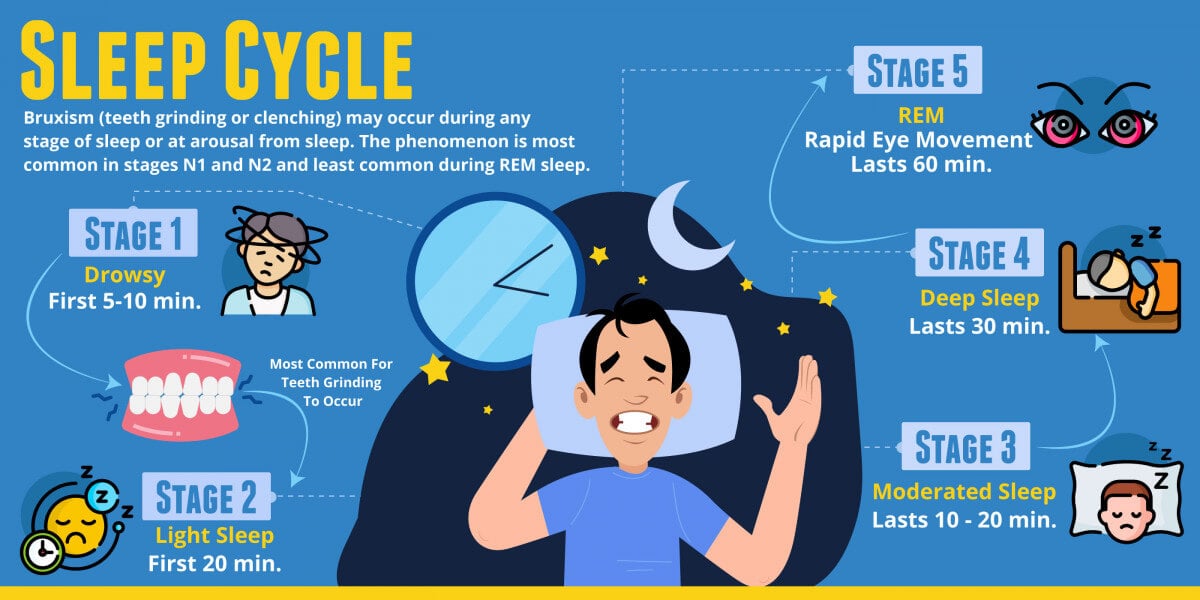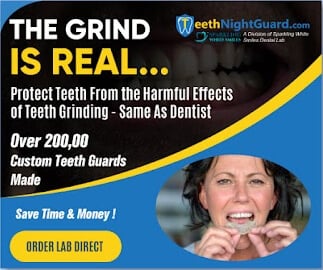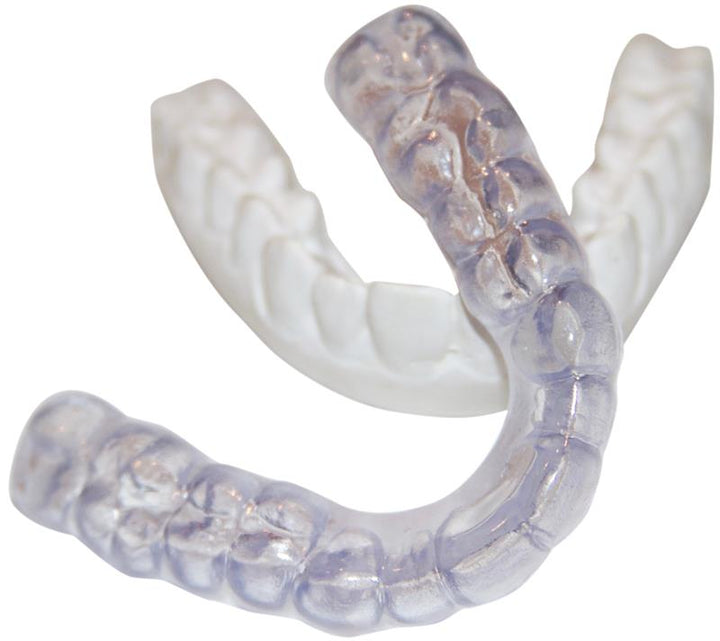STAGES OF SLEEP AND TEETH GRINDING
The body may rest, recover, and regenerate during sleeping. Sleep is made up of non-REM and REM sleep cycles, and it is generally thought to be necessary for the restoration and recovery of vital bodily and mental functions.
During the night, the body normally cycles through several stages of sleep.
NREM (non rapid eye movement) sleep
NREM sleep, often called quiescent sleep, is divided into three stages:
Stage 1: This is when you go from being awake to being asleep. During this stage of sleep, brain wave activity begins to slow down.
Stage 2: This is a light sleep stage during which a person's heart rate and respiration slows, their body temperature drops, their muscles relax, and their eye movements halt.
Stage 3 entails a period of profound, restful sleep. During the first half of the night, you will be in this sleep phase.
REM (rapid eye movement) sleep
About one and a half hours after falling asleep, a person enters REM sleep. Rapid side-to-side eye movements, increased brain wave activity, and erratic breathing are all signs of REM sleep.
There are some dental problems associated with sleep disorders. Bruxism is one of those that usually occur during NREM (Non rapid eye movement).

Sleep teeth grinding - bruxism
Grinding, gnashing, or clenching your teeth is known as bruxism (BRUK-siz-um). If you have bruxism, you may subconsciously clench or grind your teeth while awake (awake bruxism) or while sleeping (sleep bruxism) (sleep bruxism).
A sleep-related movement problem is known as bruxism. People who clench or grind their teeth (brux) while sleeping are more prone to experience other sleep problems like snoring and breathing interruptions (sleep apnea).
Treatment for mild bruxism may not be necessary. Bruxism, on the other hand, can be frequent and severe enough in certain persons to cause jaw difficulties, migraines, tooth damage, and other issues.
Because you could have sleep bruxism and not realize it until difficulties arise, it's critical to be aware of the signs and symptoms of bruxism and to seek frequent dental care.
Symptoms
Bruxism can cause the following signs and symptoms:
• Sleep teeth grinding or clenching, which could wake up your sleeping companion.
• Flattened, broken, chipped, or loose teeth
• Tooth pain or sensitivity
• Jaw, neck, or facial pain or soreness • Pain that feels like an earache, but isn't.
• A dull throbbing headache that starts in the temples
• Chewing on the inside of your cheek might cause damage.
• Sleep disturbances
Causes
Doctors aren't sure what causes bruxism, although it could be caused by a mix of physical, psychological, and genetic reasons.
Risk Factors
These variables enhance your chances of developing bruxism:
• Stress. Sleep teeth grinding can be caused by anxiety or stress. Anger and frustration are other possible emotions.
• Age. Bruxism is prevalent in youngsters, but it normally fades away by the time they reach maturity.
Personality characteristics. Having an aggressive, competitive, or hyperactive personality type can raise your risk of bruxism.
• Prescription drugs and other substances Some psychiatric medicines, such as antidepressants, can cause bruxism as a side effect. Bruxism can be exacerbated by smoking tobacco, drinking caffeinated beverages or alcohol, or using recreational substances.
• People in your family who grind their teeth. Sleep bruxism is more likely to run in families.
• Other afflictions Bruxism has been linked to a variety of mental and medical conditions, including Parkinson's disease, dementia, gastroesophageal reflux disease (GERD), epilepsy, night terrors, sleep-related problems.
Complications
In the great majority of cases, bruxism does not cause significant problems. On the other side, severe bruxism might lead to:
• Damage to your teeth, crowns, restorations, or jaw
• Tension-type headaches
• Severe face or jaw pain
• Disorders of the temporomandibular joints (TMJs), which can sound like clicking when you open and close your mouth
TEETH GRINDING IN CHILDREN
Teeth grinding isn't just a problem for adults. Children grind their teeth in between 15 and 33 percent of the time. Children who grind their teeth are more likely to do so when their baby teeth first appear and when their permanent teeth appear. After these two sets of teeth have fully developed, most children lose their teeth grinding tendency.
The most usual time for children to grind their teeth is while they are sleeping, rather than when they are awake. No one knows why children grind their teeth, but improperly aligned teeth or irregular contact between upper and lower teeth, illnesses and other medical conditions (nutritional deficiencies, pinworm, endocrine disorders), and psychological factors such as anxiety and stress are all factors to consider.
Grinding your baby teeth causes very few complications. Teeth grinding, on the other hand, can result in jaw pain, migraines, tooth wear, and TMD. If your child's teeth appear worn or if he or she complains of tooth sensitivity or pain, see a dentist.
• Reducing your child's tension, especially shortly before bedtime, is one way to assist them quit grinding their teeth.
• To relax the muscles, try massage and stretching activities.
• Make sure your youngster gets lots of water in his or her diet. Teeth grinding may be connected to dehydration.
• If your child grinds their teeth, ask your dentist to keep an eye on them.
PROTECTION AGAINST TEETH GRINDING
Dental teeth grinding mouth guard
While there is no cure for bruxism, many doctors recommend mouth guards or night guards to assist prevent nighttime grinding and clenching, as well as the repercussions that come with it. The teeth are shielded by these protective devices, which cover them to prevent them from harm.
Night guards go by a variety of names. Mouth guards, occlusal guards, dental guards, bite splints, and nocturnal bite plates are some of the other names for them. They are soft or hard plastic retainer-like parts that cover the top or bottom set of teeth. Sleep bruxism is commonly treated with night guards. Night guards protect your teeth from clenching force and grinding, which can cause migraines, tooth damage, and gum inflammation.
There are a few things you may do to lessen the effects of bruxism on your oral health. One of the most frequent is a night guard, which is a mouth guard that is worn at night. Most pharmacies have some night guards that don't require a prescription. To use it, boil or microwave it according to the package directions, then let it cool for a few seconds before gently biting it to mould it to your mouth.

Your Dentist Can Make You a Custom Sleep Teeth Night Guard
You can also get a night guard from your dentist. Customized guards are of superior quality and are built specifically for your teeth. Your dentist will take an impression of your teeth, which will be sent to a dental laboratory as a mould. This business will make you a night mouth guard that is custom-fitted to your mouth. A customized night guard is typically more expensive than one purchased off the shelf. It is, nevertheless, more pleasant to wear.
Caring for Your Mouth Guard
It's recommended to wear the mouth guard right before going to bed. As soon as you wake up, you can pull it out. After four to six weeks of wearing it, it should begin to feel comfortable.
The Cleveland Clinic recommends that you wash your mouth guard before and after each use. Brush your mouth guard with a toothbrush and toothpaste after rinsing it with cold water. Do not leave the night guard in a hot or sunny location. Also, avoid washing it in hot water, since the plastic may stretch and no longer fit you properly. Keep your mouth guard in a safe place and inspect it on a regular basis. It's usually time to replace your guard if you notice it's loose or unpleasant.
Types of dental night guards
Soft night guard
This is the most frequent type of night guard for teeth used to treat bruxism, and it is best suited for mild or occasional occurrences rather than severe teeth grinders.
This is the most frequent type of night guard for teeth used to treat bruxism, and it is best suited for mild or occasional occurrences rather than severe teeth grinders.
Pros
Of all the night guards, this one has the most comfortable fit.
Most adaptable/easy to adjust
Usually less expensive
Cons
Unintentionally, some people clench or chew the soft substance.
Lifespan isn't as long as it could be.
Due of the short lifespan of most products, most warranties are only 6 months or less.
This isn't a long-term fix.
Dual Laminate / Hybrid night guard
This sort of Bruxism night guard is made for people who grind their teeth relatively often. They have a soft interior and a rigid outside.
Pros
Handles gripping and grinding with ease.
More long-lasting
Soft guards usually have a longer warranty than hard guards.
Cons
They have a thicker build than the other guards.
It appears to be more difficult to acclimatize to.
Hard night guards
To treat teeth, hard night guards are used. Bruxism is constructed of acrylic and are very hard but long-lasting. They can be used to treat TMJ and severe cases of grinding.
Pros
Most long-lasting Prevents tooth shifting
Usually, the longest warranty is offered.
Cons
Night guards that are thicker than soft night guards
Uncomfortable in comparison to others
Sleeping in is difficult to adjust to.
Because an accurate imprint is required for fit, it must be ordered directly from the dentist.
It's possible that it'll be pricier than the others.
Recommendations for adjustment of Night Guards for Teeth
Select the smallest possible guard for your needs.
Stick with it for a minimum of 4-6 weeks and make wearing it a habit. It should feel like a natural part of your routine after this amount of time, and it will be a lot easier to wear.
It's best if you put it in soon before you go to bed. If you try to put it on before you're ready to go to bed, it'll just make you feel obnoxious.
FITTING YOUR CUSTOM NIGHT GUARD FOR YOUR TEETH
Depending on the brand you choose, you can customize the fit of your night guard. Many of them employ the same technology as snoring mouthpieces. The following are the many night guards for bruxism:
One-size-fits-all.” You can purchase mouth guards that are not specially fitted over-the-counter. These are generally the cheapest choice and may work for the occasional teeth grinder.
Boil then bite. To make your own impression, simply boil the type in water and bite into it. It's usually rather straightforward to perform and appears to be the most popular type.
Place your order on the internet. You can order night guards from the comfort of your own home. You transmit your impression to the firm you ordered from, and they send you a mouthpiece that fits perfectly.
Made in a laboratory. Mouth guards are available from your dentist. Because they are produced using your impression in a lab, they provide the most exact fit.
Don't worry if you think you could have bruxism. Night guards are an easy way to treat it. However, before seeking further treatment, it's always a good idea to consult a doctor to see if you can find the main reason and solve it. Sleep apnea might be a contributing factor in some cases.
References
Firmani, M., Reyes, M., Becerra, N., Flores, G., Weitzman, M., & Espinosa, P. (2015). Bruxismo de sueño en niños y adolescentes [Sleep bruxism in children and adolescents]. Revista chilena de pediatria, 86(5), 373–379. https://doi.org/10.1016/j.rchipe.2015.05.001
Kuhn, M., & Türp, J. C. (2018). Risk factors for bruxism. Swiss dental journal, 128(2), 118–124.
Camoin, A., Tardieu, C., Blanchet, I., & Orthlieb, J. D. (2017). Le bruxisme du sommeil chez l’enfant [Sleep bruxism in children]. Archives de pediatrie : organe officiel de la Societe francaise de pediatrie, 24(7), 659–666. https://doi.org/10.1016/j.arcped.2017.04.005
Demjaha, G., Kapusevska, B., & Pejkovska-Shahpaska, B. (2019). Bruxism Unconscious Oral Habit in Everyday Life. Open access Macedonian journal of medical sciences, 7(5), 876–881. https://doi.org/10.3889/oamjms.2019.196
Felicíssimo, K., Quintella, C. M., Stuginski, J., Salles, C., Rangel Oliveira, F., & de Oliveira Barreto, L. (2018). Patents related to the treatment and diagnosis of bruxism. Expert opinion on therapeutic patents, 28(7), 561–571. https://doi.org/10.1080/13543776.2018.1484905
Stages of Sleep: REM and Non-REM Sleep Cycles (webmd.com)
Bruxism: Causes and management (medicalnewstoday.com)
https://www.mayoclinic.org/diseases-conditions/bruxism/symptoms-causes/syc-20356095
https://www.mayoclinic.org/diseases-conditions/bruxism/diagnosis-treatment/drc-20356100
JOIN OUR NEWSLETTER! RECEIVE PROMOTIONS & COUPONS FOR CUSTOM DENTAL NIGHT GUARDS
INTERESTED IN BECOMING AN AFFILIATE OF TeethNightGuard.com?
Earn 15% commission for simply sharing with your friends and family through email or social media such as Facebook, Reddit, or Twitter. Sign up and learn more here:
https://www.teethnightguard.com/pages/register-affiliate-account
EXTRA DURABLE 3MM CUSTOM NIGHT GUARD - MAXIMUM DURABILITY AND COMFORT - MOST RECOMMENDED

$119.99
Item Number SWSPRO Manufacturer Sparkling White Smiles Dental Lab Rating Product Description Love this product? Share the product page link with Friends and Family. Simply copy the product page web address or this link: Custom Teeth Night Guard and post!… Read More